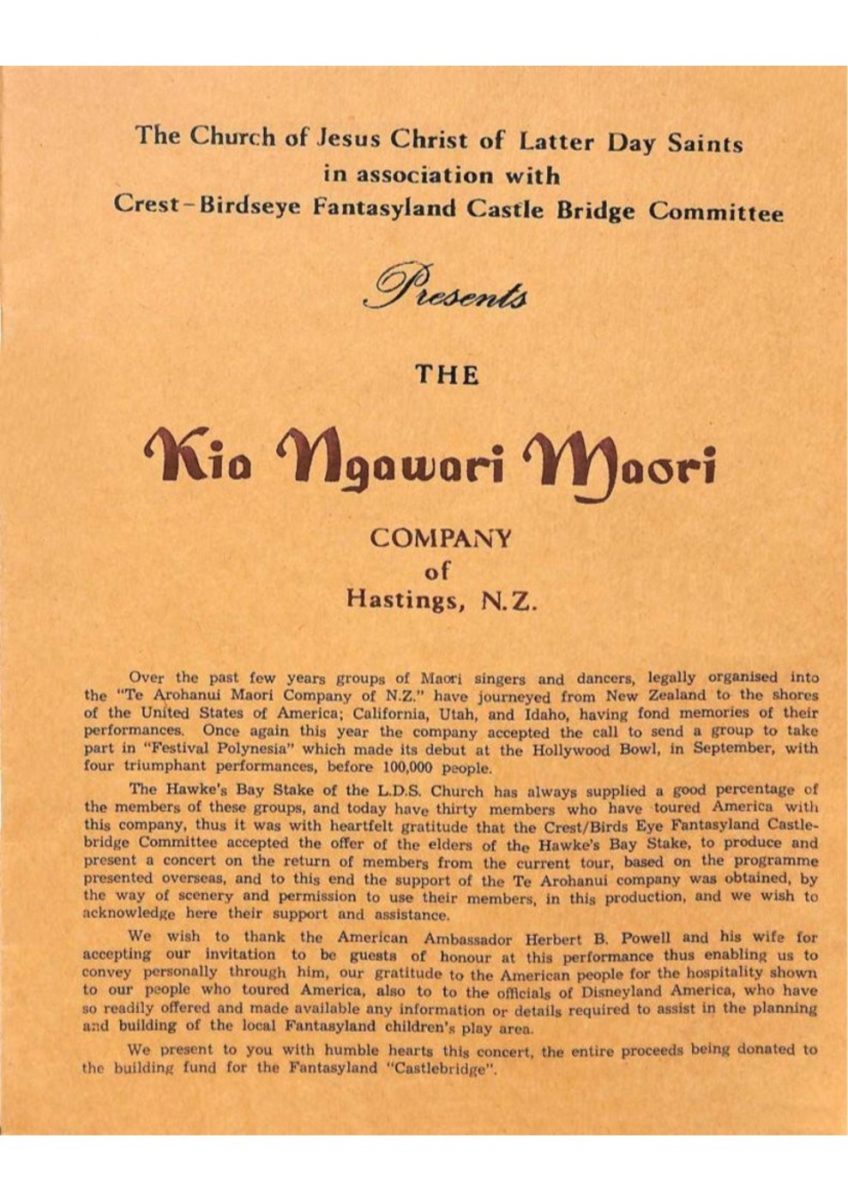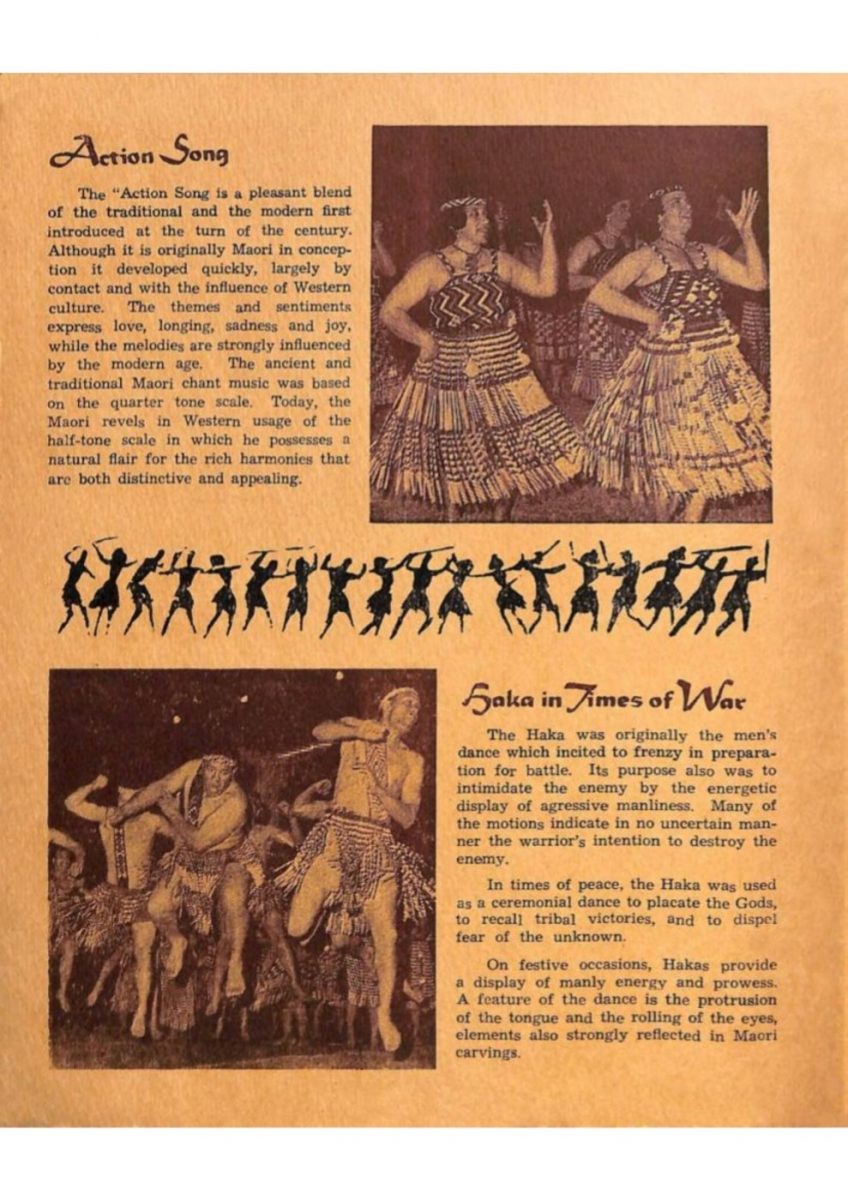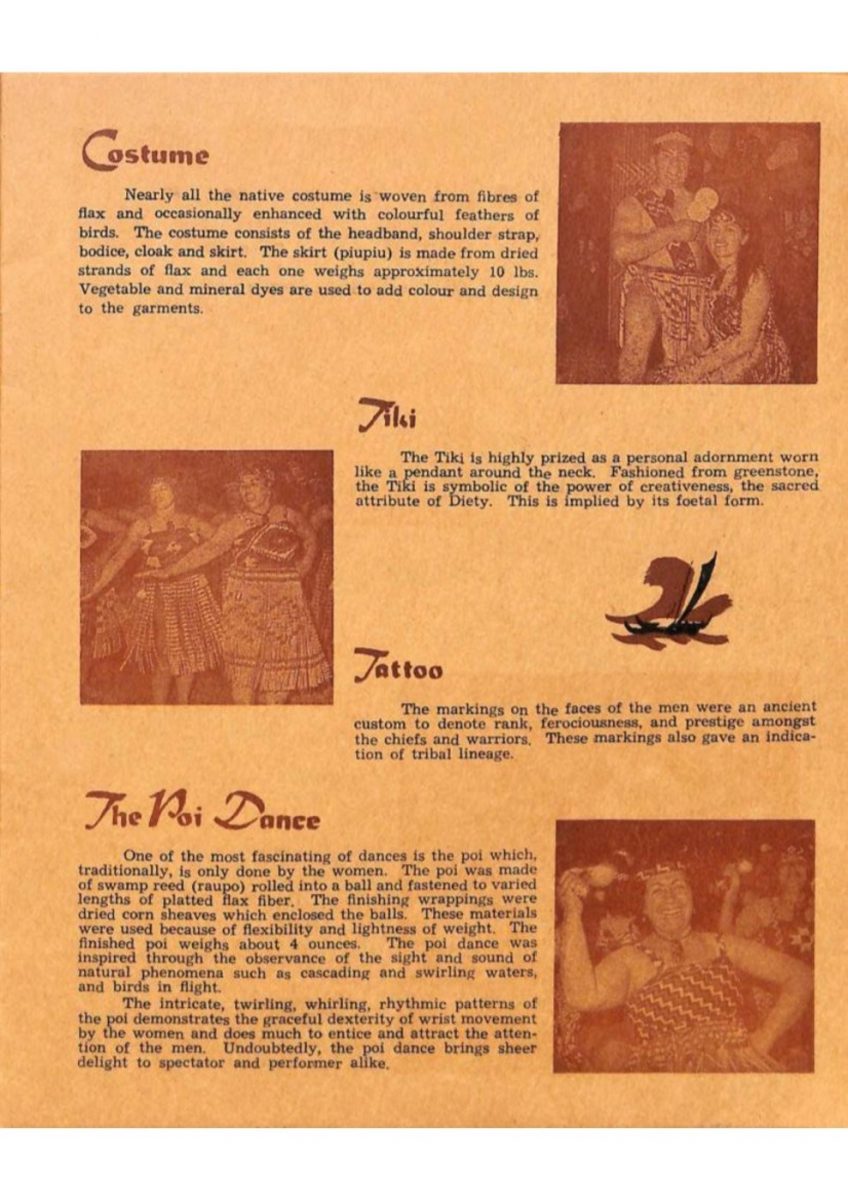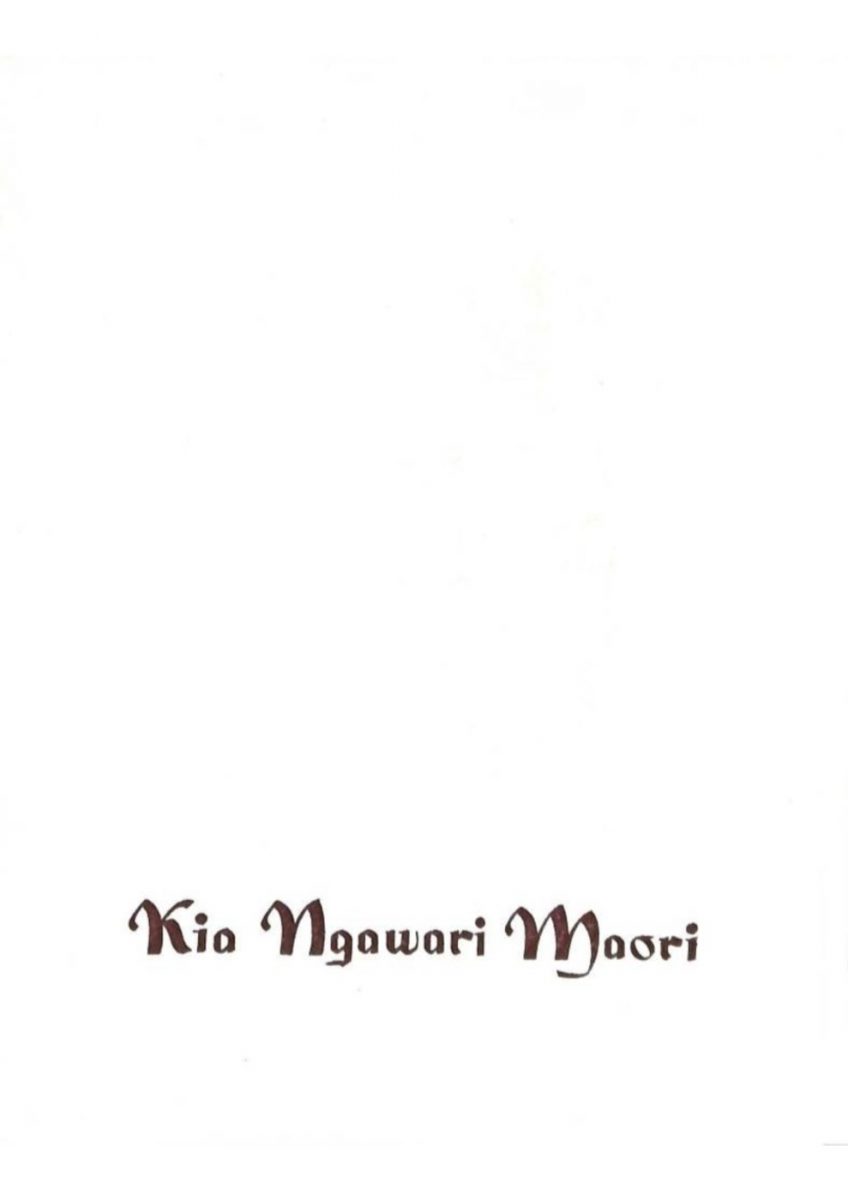- Home
- Collections
- COOZE L
- Theatre Programmes
- Programme 1966 - Kia Ngawari Maori
Programme 1966 – Kia Ngawari Maori
The Church of Jesus Christ of Latter Day Saints
in association with
Crest-Birdseye Fantasyland Castle Bridge Committee
Presents
THE
Kia Ngawari Maori
COMPANY
of Hastings, N.Z.
Over the past few years groups of Maori singers and dancers, legally organised into the “Te Arohanui Maori Company of N.Z.” have journeyed from New Zealand to the shores of the United States of America; California, Utah, and Idaho, having fond memories of their performances. Once again this year the company accepted the call to send a group to take part in “Festival Polynesia” which made its debut at the Hollywood Bowl, in September, with four triumphant performances, before 100,000 people.
The Hawke’s Bay Stake of the L.D.S. Church has always supplied a good percentage of the members of these groups, and today have thirty members who have toured America with this company, thus it was with heartfelt gratitude that the Crest/Birds Eye Fantasyland Castlebridge Committee accepted the offer of the elders of the Hawke’s Bay Stake, to produce and present a concert on the return of members from the current tour, based on the programme presented overseas, and to this end the support of the Te Arohanui company was obtained, by the way of scenery and permission to use their members, in this production, and we wish to acknowledge here their support and assistance.
We wish to thank the American Ambassador Herbert B. Powell and his wife for accepting our invitation to be guests of honour at this performance thus enabling us to convey personally through him, our gratitude to the American people for the hospitality shown to our people who toured America, also to [to] the officials of Disneyland America, who have so readily offered and made available any information or details required to assist in the planning and building of the local Fantasyland children’s play area. We present to you with humble hearts this concert, the entire proceeds being donated to the building fund for the Fantasyland “Castlebridge”.

Action Song
The “Action Song is a pleasant blend of the traditional and the modem first introduced at the turn of the century. Although it is originally Maori in conception it developed quickly, largely by contact and with the influence of Western culture. The themes and sentiments express love, longing, sadness and joy, while the melodies are strongly influenced by the modern age. The ancient and
traditional Maori chant music was based on the quarter tone scale. Today, the Maori revels in Western usage of the half-tone scale in which he possesses a natural flair for the rich harmonies that are both distinctive and appealing.
Haka in Times of War
The Haka was originally the men’s dance which incited to frenzy in preparation for battle. Its purpose also was to intimidate the enemy by the energetic display of agressive [aggressive] manliness. Many of the motions indicate in no uncertain manner the warrior’s intention to destroy the enemy.
In times of peace, the Haka was used as a ceremonial dance to placate the Gods, to recall tribal victories, and to dispel fear of the unknown.
On festive occasions, Hakas provide a display of manly energy and prowess. A feature of the dance is the protrusion of the tongue and the rolling of the eyes, elements also strongly reflected in Maori carvings.

Costume
Nearly all the native costume is woven from fibres of flax and occasionally enhanced with colourful feathers of birds. The costume consists of the headband, shoulder strap, bodice, cloak and skirt. The skirt (piupiu) is made from dried strands of flax and each one weighs approximately 10 lbs. Vegetable and mineral dyes are used to add colour and design to the garments.
Tiki
The Tiki is highly prized as a personal adornment worn like a pendant around the neck. Fashioned from greenstone, the Tiki is symbolic of the power of creativeness, the sacred attribute of Diety. This is implied by its foetal form.
Tattoo
The markings on the faces of the men were an ancient custom to denote rank, ferociousness, and prestige amongst the chiefs and warriors. These markings also gave an indication of tribal lineage.
The Poi Dance
One of the most fascinating of dances is the poi which, traditionally, is only done by the women. The poi was made of swamp reed (raupo) rolled into a ball and fastened to varied lengths of platted flax fiber. The finishing wrappings were dried corn sheaves which enclosed the balls. These materials were used because of flexibility and lightness of weight. The finished poi weighs about 4 ounces. The poi dance was inspired through the observance of the sight and sound of natural phenomena such as cascading and swirling waters, and birds in flight.
The intricate, twirling, whirling, rhythmic patterns of the poi demonstrates the graceful dexterity of wrist movement by the women and does much to entice and attract the attention of the men. Undoubtedly, the poi dance brings sheer delight to spectator and performer alike.

PERFORMANCE OF KIA NGAWARI MAORI COMPANY
MUNICIPAL THEATRE, HASTINGS, OCTOBER, 1966
PROGRAMME
NATIONAL ANTHEMS
H.B. STAKE CHOIR: Conductor: S. Crawford.
Kia Ngawari (Be Humble)
Kla Ngawari was composed by the late Walter Smith in 1946 in memory of Apostle Cowley of Salt Lake City, who was Mission President of New Zealand during World War II. President Cowley won the hearts of both Maori and Pakeha alike. He was a classic example of humility, love and charity and it is with small wonder that this choral arrangement has become widely known and increasingly so since his passing away in 1953.
Kia Kotahi (with one united voice)
Each Stake of the L.D.S. Church has its own Stake Choir which, at each quarterly Stake Meeting renders Sacred Songs at the various services. Normally these Choirs do not perform outside of the Church, so it is with great pleasure that we present over 100 voices of the H.B. Stake Choir.
ESTA KERSHEW: Long Poi Dance.
Vocal – Here Wainohu, Camelia Hapi, Lillian Kershaw.
Guitarist – Wallace Maere.
The ancient arts and skills of the Maori Race are still taught as 5-year-old Esta will show.
JUNIOR ORCHESTRA: Doh Ray Me, Po Kare Kare Ana, I’m Forever Blowing Bubbles, Side By Side.
Conductor – Syd Kamau Vocal – Beverley Ross
Syd Kamau, well known throughout Hawke’s Bay for his teaching of music, brings to you this group of nine players ranging from 8-12 years of age. We all know of the love the Maori has for music and it is lovely to see Syd imparting this love to our children.
SOLO: George Ferris.
MOONGLOWS:
Mesdame – Mary Reid, Rose Puriri, Kara Parahi, Lydia Poto and Camelia Hapi.
Messrs – Gooch Parahi and Jim Puriri. Accompanied by John Mulaney and Wallace Maere.
On the return of the N.Z. Opera Company from their successful tour of Australia, local members of the cast took the opportunity to visit some of the night spots and came to the conclusion that they themselves could compare with the best they had seen. We present the Moon-Glows.
DUET: Here Wainohu, Crete Kara.
CAROLINE McCLUTCHIE. Accompanied by the “EXCELS.”
KAPI ERU: – Pearly Shells, Just a Closer Walk With Thee, Pania of the Reef.
KORONGATA SINGING MOTHERS: Beautiful Lady, Love Walked In, Hawaiin [Hawaiian] Wedding Song.
Throughout the L.D.S. Church, each Ward establishes a relief society as part of women members commitment of the Church. The Relief Society has many activities such as sewing etc., which is used to assist needy families. They also have cultural activities where members voluntarily form into groups to learn and improve that which interests them. Singing being one of these cultures, we present to you – seventeen Singing Mothers of the Bridge Pa Ward.
INTERVAL
Ceremonial Welcome to our Distinguished Guest –
The American Ambassador to N.Z. Herbert J. Powell.
Traditionally, the Maori programme begins with a ceremonial welcome which consists of several sections. The village is alerted to the approaching visitor by a scout who raises the alarm. Warriors appear with long spears, or taiaha, grimacing and prancing to and fro, gradually approaching within striking distance of the visitor. They place a dart-like spear, or other gift, in his path. By picking it up, the visitor signifies that he accepts the hospitality of the village. This section is called the WERO, or challenge. As the visitor begins to follow the warriors into the village, the leading women of the tribe wail a cry of welcome, or karanga. Upon completion of the wailing to a chant, “KEI RUNGA, KEI RARO,” the people from the village come from their homes on to the marae, or village meeting place, and greet the visitor with the Women’s Haka, “TE RUNGA TU.” The fresh leaves waved by the people are to extend the beckoning sign of welcome to the visitor. The visitor greeted by the Chief in the traditional fashion, by pressing noses, the hongi.
Culminating the traditional welcome is the song of greeting. “KARANGA TIA RA.”

INTRODUCTION OF THE AMBASSADOR – By His Worship the Mayor, Mr R. Giorgi.
PRESENTATION OF GIFT – On behalf of the Kia Ngawari Maori Company.
GREETINGS AND REPLY – By the Ambassador.
His Worship the Mayor will escort the Ambassador back to his seat.
TOIA MAI TE WAKA – Moving of the canoes in preparation for a long journey
THE MIGRATION OF THE SEVEN CANOES: Narrator, Jewell Shaw.
E OHO E TE WHANAU – After having been told by the high priest chief that they must leave their legendary home of Hawaiki, the people gather and sing farewell to their homes that they will now only be able to keep in their memories.
HAERA RA – Moving to their canoes, the tohunga blesses each of the seven and gives it a name from which all Maoris, even today, can trace their ancestry. The names of the seven canoes are: Tainui, Te Arawa, Mataatua, Aotea, Kurahaupo, Tokomaru and Takitimu. In their canoes, the people, paddling slowly at first, bid farewell to the land that they leave, and the land itself seems to be singing farewell to them. Finally, as the land of the past falls far behind, they pick up speed, and the excitement of the open sea helps them to fly swiftly and happily over the waters.
WAKA POI – Using the poi ball, the women show the movement of the water and the wind and of the sky, as the men pull heartily towards the unknown horizon.
UIA MAI – A challenge is offered between the canoes, and as they race across the waters the pukana stands, and by her expressions and movements, encourages the people to greater efforts.
WHITIKI TAUA – Finally, through the mists land is seen. It is Aotearoa – the land of the long white cloud. The canoes race towards the shore to the ever-faster chants of the men.
TITIRO MAI – The Thanksgiving. With land safely under their feet, the people give thanks for their safe arrival:
“We, thy people, thank thee,
For we have arrived.
Have found our harbour,
Now we rest, now we rest.”
MAORI STICK GAME:
This game was primarily intended for the younger generation: training them in dexterity of hand and quickness of eye, and the ever alertness of the mind. The Maori depended largely on the use of his hands in the acquiring of food and their everyday needs.
TAKU RIPENE PAI:
An action song of modern arrangement taken from an ancient composition. A dance of love and courtship.
PAKI KINI
Action song of courtship.
THE POI:
The Poi in its original form was a prayer. It was a Supplication to the Supreme Being for assistance in their daily existence to overcome the elements, to bless the fertility of the women folk, the ever abundance of their fishing grounds, and other fields of food and raiment.
It was only in quite recent years that the Poi was “put” to music giving us the Poi of today. It would be interesting to note that this form of the Poi could be attributed to one of our local Maoris, well-known in yester-years, Mr Paraire (Friday) Tomoana. who with the late Sir Apirana Ngata did much to foster and bring to such popularity the “Poi” thoughout New Zealand.
KA PANAPANA:
A posture dance. An expression of delight, for all the multitudes who came in hundreds to alight on the present scene of Hastings.
RUAMOKO:
This men’s classic was composed in the eighteenth century and was the start item of the great reception to their Royal Highnesses, the Duke and Duchess of York at Rotorua. It was again prominent in the Maori welcome to the Prince of Wales, and lastly to Her Majesty, Queen Elizabeth II at Rotorua. This dance is perhaps regarded as one set aside for special occasions.
A MAPI:
An action song in honour of the late King Koroki, and displays many of his well-known characteristics.
E TE HOKO WHITU:
An action song in honour of that hero of the Second World War, Lieutenant Te Moananui A Kiwa Ngarimu V.C. of the Maori Battalion.
PO ATARAU:
Now is the Hour.
THE END
Presentation of cheque, by President James L. Southon, representing the L.D.S. Church to Mr Peter Naera, Birds Eye employees.

Kia Ngawari Maori
COMPANY of Hastings, N.Z.
ORGANISING COMMITTEE: –
President: James L. Southon.
Chairman: Mr G.P. (Price) Harris. Committee: Messrs S.J. Crawford, P. Edwards, C. Hawea, H. Meha, E. Tahau, (L.D.S. Church). P. Naera and R. Stalker (Crest/Birds Eye).
Chief: Joseph Pineaha
Chief’s Warrior: Mane Neho.
Leader: Alan Peihopa.
Pois [Poi] and Sticks: Wairukuruku Maere.
Special Effects: Hugh Ivory.
Choreographer: Islet Puriri
Make-up: Mary Reid.
Accompianists: Simone Kare Kare, Hugh Southon, Cyril Paea.
Compere: Crete Kara.
Stage Manager: E. Tahau.
Wardrobe Mistress: Meriana Whakamoe
Sound: Ian Galbraith.
Electricians: E.G. Phillips, J.D. Henderson.
Programme Sellers: Junior Maori Cultural Group, Te Karere (The Messengers).
CAST:-
Monica Henderson
Hana Cotter
Teiti Watene
Leone Watene
Hine Ferris
Janet Arthur
Caroline Ratima
Kate Southon
Mabel Meha
Mere Reid
Poppy Maere
Sarah Chase
Harriet Purcell
Moetu Randell
Milly Mareikura
Akavana Parahi
Kinemaka Hapi
Marie Pere
Lyola Randell
Ramona Purcell
Ellen Matthews
Grace Peihopa
Mihi Harris
Mary Paki
Agnes Collier
Mary Makutu
Mate Kohu
Ansie Neho
Feedles Reid
Irani Waihi
Naomi Smith
Joy Abbott
Mary Solomon
Louie Chase
Joyce Hoetawa
Camelia Hapi
Huia Karaitiana
Caroline Watene
Lydia Poto
Ella Hawea
Winnie Pere
Moana Rarere
Letti Miller
Myra Otene
Marie Selwyn
Heta Watene
Crete Kara
David Edwards
Tom Dehar
Tom Curtis
George Ferris
Aka Arthur
Perry Hanara
Taka Walker
Kara Parahi
Ray Paki
Michael Curtis
John Karaitiana
Bill Ruwhiu
Kate Parahi
Desmond Ratima
Daniel Dehar
George Ferris Jnr.
Jacob Dehar
Peter Matthews
Peter Mareikura
Pine M. Henderson
Ottley Hawea
CREST/BIRDS EYE FANTASYLAND COMMITTEE
MESSRS: – T.J. Collingwood, J. Donaldson, J.M. Heron, H.G. Ivory, A.J. McDonald. P. Naera, D. Rapley, K. Smith, R. Stalker.
ACKNOWLEDGEMENTS
Amners Lime Company; Firth Concrete Ltd; Newmans Bus Company for assistance with Float; The Manager and Staff of the Hastings Branch N.Z. Apple and Pear Marketing Board. Margo Press for help and assistance in producing this programme. Superintendent of Parks and Reserves for assistance with Floral Decorations. Process Signs for Art Work; Dawn Meat Company, Donation; H.B. Herald-Tribune; N.Z. Broadcasting Corporation, Daily Telegraph for Publicity.

Fantasyland
Fantasyland is becoming a reality; by Christmas some of the planned creations should be operating.
Fantasyland had its beginnings three years ago when Mr H.B. Poppelwell announced a plan to transform Windsor Park’s sprawling 66 acres into “pleasure gardens”. Although approved in principal [principle], this plan was finally dropped. Later on the prompting of Mr C. Barclay, Greater Hastings launched “Fantasyland”, a Trust Board and a Public Committee was formed, and £14,000 raised by way of a Queen Carnival.
The £14,000 is to be the foundation of the “Fantasyland” project, to be spent on developing the 3½ acre area, and providing the necessary services (water, electricity, fencing and paving etc.); the major attractions to be sponsored by business firms, individuals and organizations.
CREST BIRDSEYE CASTLEBRIDGE APPEAL
DONATIONS FOR FANTASYLAND
IN THE FOYER OF THIS THEATRE WE ARE DISPLAYING A SCALE MODEL OF THE CASTLEBRIDGE AT WHICH YOU CAN MAKE YOUR DONATION AND ASSIST US IN THIS COMMUNITY PROJECT.
Castlebridge
Fund raising for the employees of the Crest/Birds Eye factory did not stop at the end of the Fantasyland Queen Carnival last year, when they raised £3,105; they decided to take over the job of raising the £4,000 needed to build the Castlebridge.
The idea of the castle was evolved by staff members during the Queen Carnival, who launched the Castle Bridge appeal, the sum of £611 being raised on this project during the carnival. Continuing on they have now in hand the sum of £2,400 plus £600 promised by staff members (being the balance of the staffs’ £1,000 donation scheme whereby employees give 2/- per week for 50 weeks), and it is hoped that whilst you read this, the day’s activities will have realised our target of £4000.
The tenders for the construction of the bridge are due to be called, and it is hoped that the bridge will be well on the way to completion by Christmas.

Unilever New Zealand Limited has sponsored this programme in recognition of the Crest/Birds Eye factory staff’s contribution to community relations in Hastings. The Company acknowledges particularly the spirit and dedication of its staff in sustained and successful fund-raising efforts for Fantasyland.

Non-commercial use

This work is licensed under a Attribution-NonCommercial 3.0 New Zealand (CC BY-NC 3.0 NZ).
Commercial Use
The donor of this material does not allow commercial use.Can you help?
The Hawke's Bay Knowledge Bank relies on donations to make this material available. Please consider making a donation towards preserving our local history.
Visit our donations page for more information.
Description
Surnames in this programme –
Abbott, Arthur, Barclay, Chase, Collier, Collingwood, Cotter, Crawford, Curtis, Dehar, Donaldson, Douthon, Edwards, Eru, Ferris, Galbraith, Giorgi, Hanara, Hapi, Harris, Hawea, Henderson, Heron, Hoetawa, Ivory, Kamau, Kara, Karaitiana, Kare Kare, Kershaw, Kohu, Maere, Makutu, Mareikura, Matthews, McClutchie, McDonald, Meha, Miller, Mulaney, Naera, Neho, Ngarimu, Ngata, Otene, Paki, Parahi, Peaea, Peihopa, Pere, Phillips, Pineaha, Poppelwell, Poto, Powell, Purcell, Puriri, Randell, Rapley, Rarere, Ratima, Reid, Ross, Ruwhiu, Selwyn, Shaw, Smith, Solomon, Southon, Stalker, Tahau, Tomoana, Waihi, Wainohu, Walker, Watene, Whakamoe












Do you know something about this record?
Please note we cannot verify the accuracy of any information posted by the community.